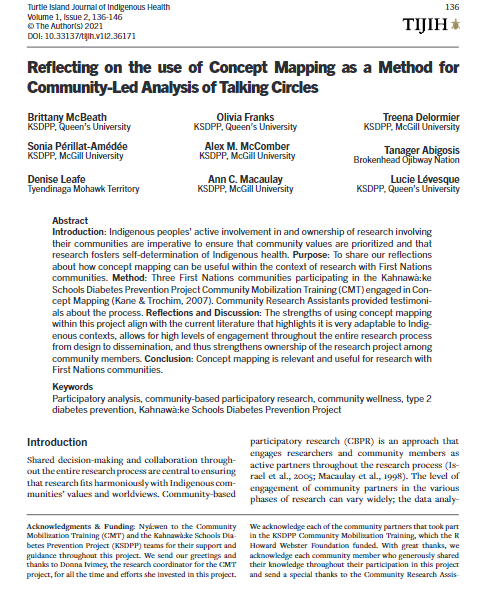
Reflecting on the use of Concept Mapping as a Method for Community-Led Analysis of Talking Circles
Publication Year: 2021
Author(s): McBeath B, Franks O, Delormier T, Périllat-Amédée S, McComber A, Abigosis T, Leafe D, Macaulay A, Lévesque L
Abstract:
Indigenous peoples' active involvement in and ownership of research involving their communities are imperative to ensure that community values are prioritized and that research fosters self-determination of Indigenous health. To share our reflections about how concept mapping can be useful within the context of research with First Nations communities. Three First Nations communities participating in the Kahnawà:ke Schools Diabetes Prevention Project Community Mobilization Training (CMT) engaged in Concept Mapping (Kane & Trochim, 2007). Community Research Assistants provided testimonials about the process. The strengths of using concept mapping within this project align with the current literature that highlights it is very adaptable to Indigenous contexts, allows for high levels of engagement throughout the entire research process from design to dissemination, and thus strengthens ownership of the research project among community members. Concept mapping is relevant and useful for research with First Nations communities.
Source of Publication: Turtle Island Journal of Indigenous Health
Vol/Issue: 1(2), 136-146 pp.
DOI No.: https://doi.org/10.33137/tijih.v1i2.36171
Publisher/Organisation: Turtle Island Journal of Indigenous Health
URL:
https://jps.library.utoronto.ca/index.php/tijih/article/view/36171/28706
Theme: Indigenous People | Subtheme: Indigenous Communities
Related Documents
Research Papers/Articles
Implementation lessons from World Bank operations in supporting indigenous peoples
Published Year: 2023
Abstract:
To identify lessons from World Bank operational experience in addressing implementation challe... Read More
Reports
State of the World’s Indigenous Peoples, Vol 1
Published Year: 2009
Abstract:
The situation of indigenous peoples in ma... Read More



